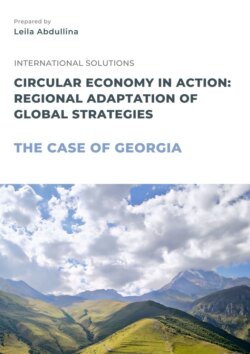Читать книгу Circular economy in action: Regional adaptation of global strategies. The case of Georgia - - Страница 9
Chapter 1. CE in developed countries
1.2.4. Netherlands
ОглавлениеThe Netherlands is considered one of the forerunners in the world regarding the CE due to its ambitious strategy and integration of sustainable principles into key sectors of the economy. In 2016, the country adopted the Circular Netherlands by 2050 program with the aim of full transition to a CE and excluding the use of primary fossil, metallurgical, and mineral resources [45]. A second, intermediate goal is to reduce the consumption of these resources by 50% by 2030. This strategy relies on close collaboration between the government, business, academia, and citizens, allowing for the development of inclusive and scalable solutions.
In the Netherlands, the National Program for CE 2023—2030 was adopted. It encompasses a broad area, including reduction in primary resources, material recycling, prolonging the useful life of products, and substitution of secondary and bio-based materials. One of the critical components of the program pertains to improving recycling processes to make use of resources efficiently, especially within priority sectors like consumer goods, building materials, plastics, and agriculture. The program also includes international cooperation to make the transition equitable, such as on environmental standards and improving labor conditions along the value chain [46]. It also sets out a package of incentivizing and regulatory measures for reaching the objectives on reducing CO₂ emissions and increasing the resilience of the Dutch economy. According to reports, a number of challenges are said to face the national CE program for 2023—2030, including limited budgetary resources (fig.12).
Figure 12. Financing of the CE in the Netherlands, thousand euros
Among the major drivers of CE development in the country is high population density and lack of natural resources-a factor that makes efficient material use vitally important. Waste recycling systems are actively being developed in the country, and among the priorities are organic, construction, and plastic waste. This has been made possible through a strictly regulated waste segregation system and the implementation of innovative recycling technologies [47]. For example, construction waste recycling allows the production of high-quality secondary materials, which are used in road construction and the housing sector.
The Netherlands is also at the forefront of plastic recycling. The country is part of the Plastic Pact NL initiative, under which the goal is to have 100% of the packaging made of recyclable plastic by 2025 [48]. Further, innovative projects like chemical recycling plants are making complicated types of plastics into raw materials for the manufacture of new materials. These technologies substantially reduce dependence on primary plastics and reduce the carbon footprint of the industry.
Agriculture also contributes importantly to the CE of the Netherlands. Recycling organic waste, like manure and agricultural residues, into biogas and compost, which are used as fuel and fertilizers, respectively. Furthermore, initiatives on vertical farming and aquaponics methods are underway, limiting the use of water and soil while generating a more sustainable food value chain.
Dutch industry is embracing circular models, like the recycling of metal waste. Several eco-industrial parks have been created in the country’s largest industrial and logistics center, the port of Rotterdam, in which one company’s waste serves as a resource for another. This helps minimize the amount of waste generated along with lowering CO₂ emissions. One successful example includes a carbon recycling program that transforms carbon emissions into chemical products and construction materials.
The Netherlands is also heavily investing in education and research initiatives. Universities and research centers such as Delft University of Technology play a key role in developing new technologies and training specialists in sustainable development. Support programs for startups and innovative companies help implement circular solutions in small and medium-sized enterprises. For instance, the Amsterdam-based platform Circle Economy provides companies with tools to transition to closed-loop production models.
International cooperation is a key factor in the success of the Netherlands. The country actively participates in European and global initiatives for the CE, thus enabling it to attract investment and share best practices with other countries. That is why the Netherlands has been called a “living laboratory” of the CE: it can scale up innovative solutions and integrate them into the real economy.
Despite active promotion of the CE, the introduction of RE in the Netherlands has been burdened with a number of serious problems for quite a long time. The first important problem concerns slow sector development in comparison with many other EU countries. In 2015, the proportion of RE in the country’s overall energy balance equaled just 5,8%, the lowest index among all the EU nations. Whereas, in 2022, the Netherlands got only 15% of its consumption of energy from renewable sources [49]. The reason for this lag is explained by the heavy dependence on natural gas from the large Groningen field and the absence of sufficient government incentives.
Key barriers included constrained investments in wind and solar energy, lack of infrastructure to integrate RE, and high technology costs at an early stage of their deployment. Besides, the densely populated country with limited land made it complicated to construct large RE generation facilities. The low level of RE consumption can also be partly explained by the generally flat and often below-water terrain that results in a limited availability of hydroelectric resources.
In the long run, the Netherlands wants to be a fully CE: waste is to be transformed into resources, with as little environmental impact as possible, while the economy remains competitive and sustainable. These measures will not only improve the state of the environment but also reinforce the country’s position as one of the leaders in innovation and sustainable development worldwide.
